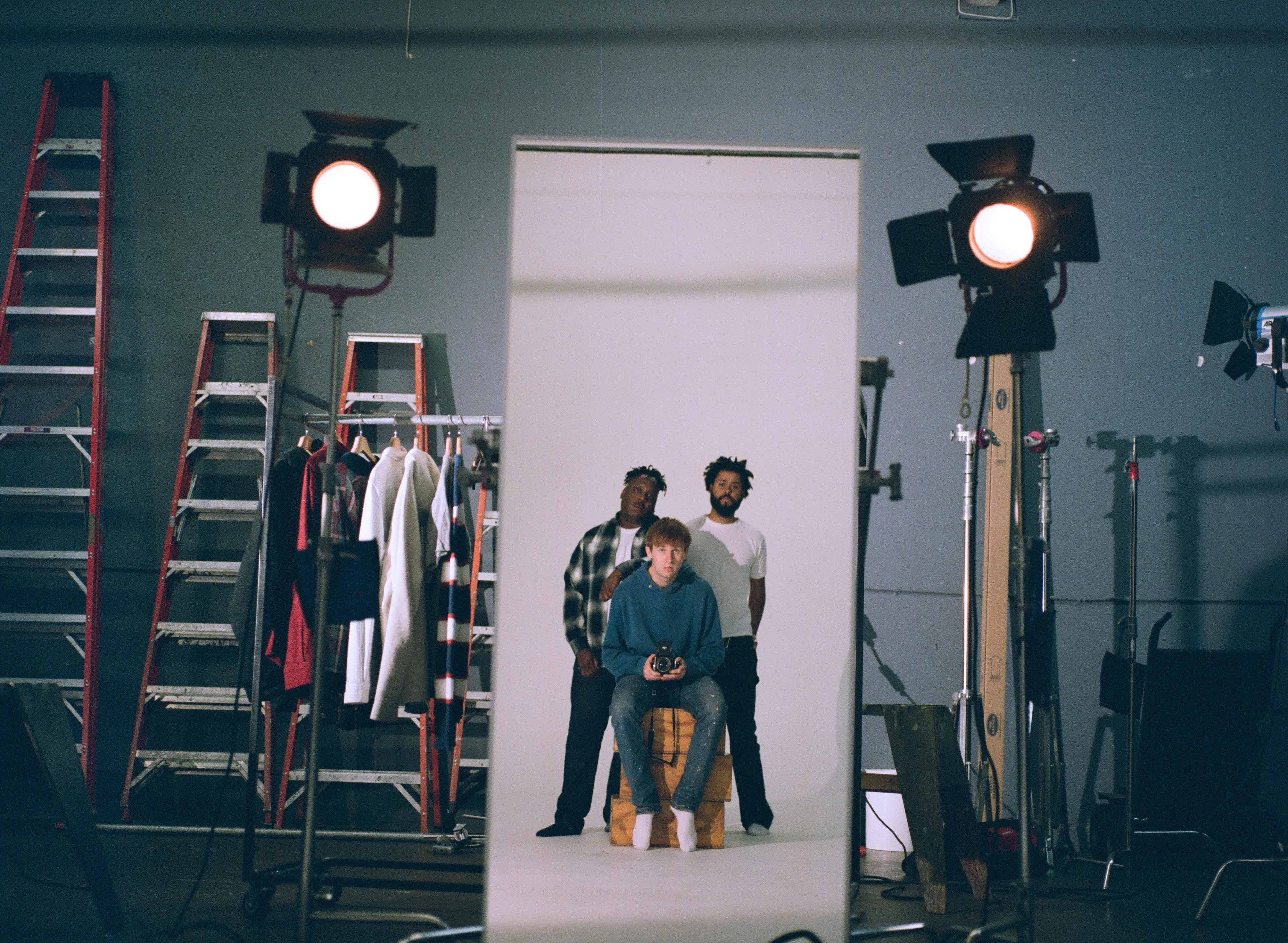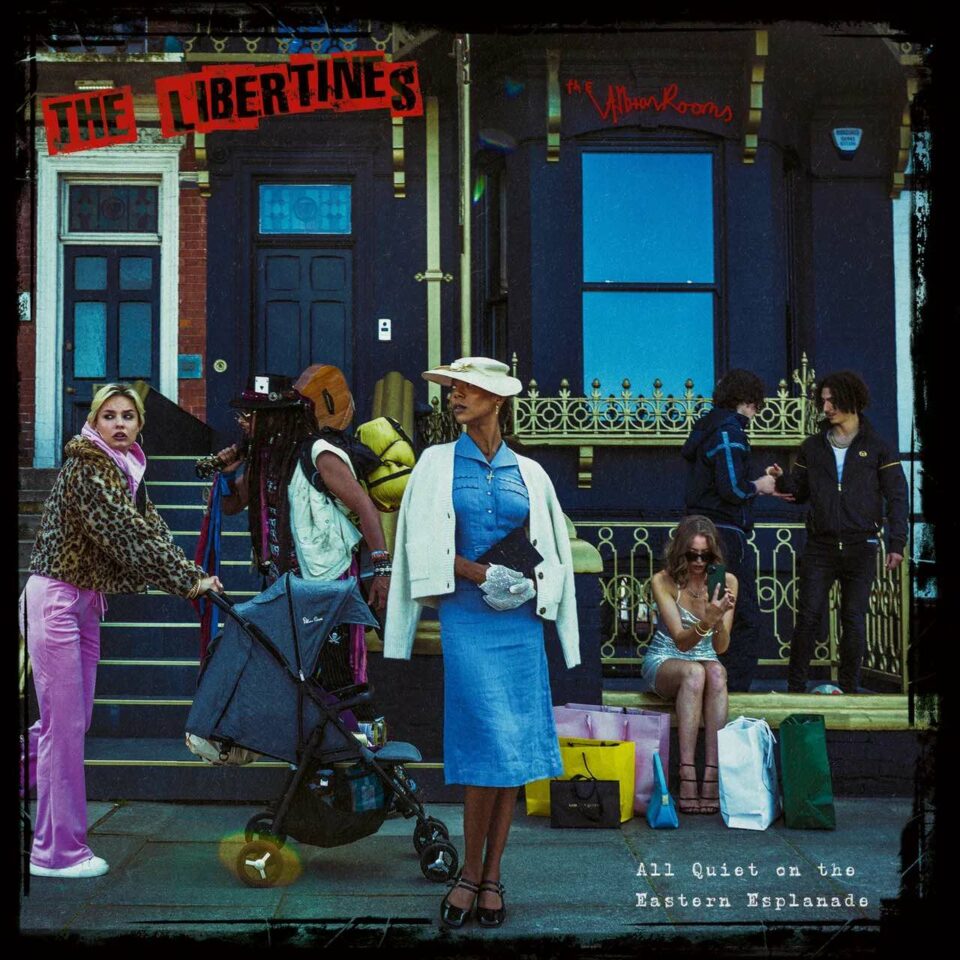Injury Reserve are less jazz rap, glitch-hop, or industrial hip-hop, and more jazz rap, glitch-hop, and industrial hip-hop. Since they came together in 2013, the trio has prided themselves in reshaping their sound, pivoting several times just within one release. The same is the case for their latest, which serves as their debut full-length. Although the music lends itself to the imprecise adjective “experimental,” it is tangible enough for the album’s diverse range of collaborators to feel at home. Rico Nasty gets to proclaim her pride in her spiky hair in “Jawbreaker,” an anti-hypebeast track, while the more traditional lyricist Freddie Gibbs sounds slick as ever on “Wax On.”
So it makes sense, then, that Injury Reserve is a little frustrated when a genre haphazardly latches onto them. The group—Ritchie with a T, Stepa Groggs, and Parker Corey—come from the rap-barren city of Phoenix, so they’re free from the historical identities that artists from Chicago, New York, or Los Angeles have to contend with. We spoke about how that lack of identity, in a way, has become their strength.
A lot of pieces have painted you in broad strokes as a jazz-rap group, but you seem to have a more punk aesthetic during your live sets. Is this intentional?
Ritchie with a T: I think that’s just as broad of a stroke. We have a little bit more of an explosive show because that’s how we like to put on shows. We look at us as a rap group, and this as a rap album. Everything’s rooted in just wanting to do something interesting in our lane. There are some heavier aspects, but it’s not in the stride of being a punk rap group—that’s just as broad of a stroke as us being called a jazz rap group.
Parker Corey: That’s becoming a frustrating theme. Anything that’s being brought to what we’re doing is rap. Rap has always taken on new pieces of things.
Ritchie: We’re looking at it auditory-wise: What can we do to make this interesting? Because what’s the point of being a band if we want to sit in one thing and the thing dies and then we die with it? We want to exist as a band where each step of the way is a step forward.
“What’s the point of being a band if we want to sit in one thing and the thing dies and then we die with it? We want to exist as a band where each step of the way is a step forward.”
Are you crafting your work to counter being put in a box, or is it like, “This sounds cool, let’s roll with it”?
Corey: I think there’s just a high bar. Part of it is this ADHD approach—anything that’s felt tread upon before gets boring really fast. Even just from a creation standpoint, shit just ends up, “What if we just cut that with that? What if it had this, but we introduce this sound that’s not usually next to this? How does that make you feel?” That kind of shit.
Ritchie: It’s less of a counter, because we actually like the majority of stuff that people think we don’t like, or that we’re talking shit about. It’s way less of that and more of just being competitive. It is a response, but it’s, “OK. Well, we’re gonna do this.” It’s less, “Fuck that.”
You have mostly left-of-mainstream artists on the guest verses. Do you feel a sense of community in that outsiderness?
Ritchie: I do think there’s some type of scene that’s coming up right now. That’s kind of a new wave of rap music that’s left-of-center: JPEGMAFIA, Rico Nasty. I do think that exists, but it may be more us being on the same wavelength than it is this thing where we’re holding hands—it’s not like this huge collective. But I do think there’s a mindset coming from a few like-minded individuals in regard to breaking the mold right now.
Parker, I read that Kanye West’s My Beautiful Dark Twisted Fantasy was the first rap album you listened to in full. Could that newness be an advantage to you guys?
Corey: I think there’s a really interesting piece of dialogue about that. The way we’ve always talked about it is that it’s not that I’ve discovered rap music late. I’ve always been to movies and stuff like that before…I wasn’t even that into music. But that was the first full album I’ve listened to, rap or otherwise, and there seemed to be some added racial element to it, to refer to that as the first rap album.
Ritchie: If you knew Parker back then, it’s just very funny to push that agenda because it’s just so false.
Corey: I guess maybe because that was the first one, and the best to me. It’s the best to a lot of people—maybe that makes it seem like we’ve never dove deeper. Groggs already was [into hip-hop] as long as we’ve known him, Nate grew up with it. But since we’ve known each other, we’ve all been pretty intense students. I think our early music ripped off De La Soul and Digable Planets and stuff like that. But that interesting tidbit was used in a reductive way, I felt.
Ritchie: Think about it: There is a big difference between being into music and sitting with an album and being like, “Whoa.” All your life you’re listening to music. There’s a difference between that and really digesting an album.
We’ve talked a bit about misconceptions. What are some other big ones people have about Injury Reserve?
Corey: I think it’s less of a misconception and more of a struggle. It doesn’t go in any one direction. But it’s the need to figure out where you put it in your brain playlist. I’ve noticed a big contrast between American and UK journalists. We were talking to a British journalist and expressing this frustration to a degree. She was like, “Yeah, isn’t that the point?” We were like, “Yeah.” There was a Pitchfork review that was like, “never quite noisy enough or quite catchy enough.” To us, that’s kind of the point.
I have a loose idea that perhaps it goes down to American individualism and the Dream—that there’s this need to figure things out to like them. Like your taste is more of an ego fulfillment. I think that’s the biggest issue that we’re having: That people want to figure it out instead of embrace the gray area.
“Perhaps it goes down to American individualism and the Dream—that there’s this need to figure things out to like them. Like your taste is more of an ego fulfillment.”
Ritchie: Parker has said previously that if you look at it as some completely experimental shit, it’s not gonna meet your standards, and if you look at it as some traditional hip-hop shit, it’s not gonna meet your standard. The whole point is that we want to do something interesting with the mindset of making a fucking rap album.
Man on the Moon was an experimental album, Acid Rap was an experimental album, De La Soul’s 3 Feet High and Rising was an experimental album. It’s just that nowadays, because of the whole algorithm idea, people need everything to be homogeneous. People have been saying weird shit. “Glitch-hop.” What the fuck is “glitch-hop?” It’s a fucking rap album.
Do you think that perspective comes from being in Phoenix, Arizona?
Corey: The freedom to get there maybe came from that. I think a huge part of it is a certain mindset and a certain personality type. The most common thing for Arizona is to choose what artist you want to sound like. Instead of choosing from the city, you’re choosing from all over. It puts you in a position where you don’t owe anything to any lineage of sound.
Ritchie: There is no sound. There is no blueprint you have to follow there. Because of that, it was purely digging on the internet. People can think what they think about us, but the reality of the situation is that 90 percent of what we do is purely based off of research. You can tell that by our music. We listen to what has happened, what’s happening right now, and we react to that and do what we wanna do to move forward. Arizona has given us that freedom because we don’t come from an Atlanta, an LA, a New York, a Chicago, a Miami, a New Orleans. There is that sound—you don’t fully have to go off of it, but you’re always responding to something. And we’re not responding to anything. FL









